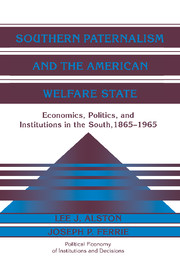 Southern Paternalism and the American Welfare State
Southern Paternalism and the American Welfare State Book contents
- Frontmatter
- Contents
- Preface
- Introduction
- 1 The Economics of Paternalism
- 2 The Politics of Maintaining Paternalism
- 3 Southern Opposition to the Social Security Act
- 4 Southern Opposition to the Farm Security Administration
- 5 The Bracero Program and Wartime Farm Labor Legislation
- 6 Mechanization and the Disappearance of Paternalism
- Conclusion
- References
- Index
- Titles in the series
Conclusion
Published online by Cambridge University Press: 05 May 2010
- Frontmatter
- Contents
- Preface
- Introduction
- 1 The Economics of Paternalism
- 2 The Politics of Maintaining Paternalism
- 3 Southern Opposition to the Social Security Act
- 4 Southern Opposition to the Farm Security Administration
- 5 The Bracero Program and Wartime Farm Labor Legislation
- 6 Mechanization and the Disappearance of Paternalism
- Conclusion
- References
- Index
- Titles in the series
Summary
We have used the methodology of the new institutional economics to understand paternalism and the forces that shaped it. Our work, then, is a case study in institutional analysis, an area in which the literature is still longer on theory than on empirical work. We believe that theoretical development in this area will come through the insights provided by the aggregation of case studies such as ours. We hope that our work will be a methodological aid to other scholars in the empirical analysis of institutions and institutional change. In conclusion, we offer a recapitulation of the main argument, a brief discussion of the lessons we learned that may be of use in the study of other cases, and an analysis of how our argument meshes with the existing literature on the growth of the welfare state in the twentieth-century United States.
In the Introduction, we provided a general framework for analyzing the interaction between institutions and contracting. In the remaining chapters, we used that framework to help us understand the economics and politics associated with paternalism in Southern agriculture. The framework highlights the importance of transaction costs in motivating the development of contractual relations. In our case study, we focus on the transactions costs associated with the use of labor in premechanized cotton production. We analyze the steps that landowners in the South took that reduced the supervision and turnover costs associated with premechanized cotton production after the abolition of slavery. They negotiated sharecrop and tenant contracts, provided paternalism to some workers, and maintained the value of paternalism by maintaining a discriminatory class and racial climate through their political agents.
- Type
- Chapter
- Information
- Southern Paternalism and the American Welfare StateEconomics, Politics, and Institutions in the South, 1865–1965, pp. 143 - 152Publisher: Cambridge University PressPrint publication year: 1999
